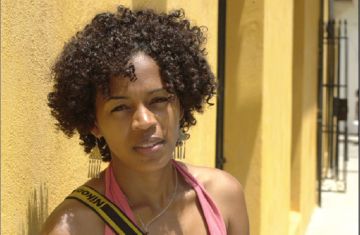 Aida Muluneh (Courtesy photo)
Aida Muluneh (Courtesy photo)
Tadias Magazine
By Tadias Staff
Updated: Sunday, August 10, 2008
New York (TADIAS) – In 1979, under Lieutenant Colonel Mengistu Haile-Mariam, the Ethiopian government sent thousands of Ethiopian children to Cuba to be educated. Cuba, an ally of Ethiopia in the Ethio-Somali war, offered housing and education for war orphans. The Cuban government accepted 2,400 Ethiopian students, aged seven to fourteen, to study at Escuelas Secundarias Basicas en el Campo (basic rural secondary schools) – on the small island of Isla de la Juventud.
The following is an interview from our archive with photographer Aida Muluneh, who is filming a documentary about their lives in Cuba.
Tadias: How did you become interested in the “Ethio-Cuban” story?
Aida: I went to a group photo exhibit in Havana in 2003 and prior to my trip I had heard about the Ethiopian students in Cuba. After searching for them, I finally met around 30 students who had been in Cuba for over twenty years. It was an amazing experience meeting these fellow Ethiopians. I soon realized that I had to come back. So in 2004, I went back and begun interviewing them to start telling their story and also to help them get out of Cuba.
Tadias: Why haven’t they left Cuba? And why haven’t they returned to Ethiopia?
Aida: They have had the opportunity to leave Cuba and return to Ethiopia; however they have no means of supporting themselves in a country they left twenty years ago. There is no incentive for them to go back to Ethiopia and resettle because life would be just as difficult, if not worse in Ethiopia. As for other countries i.e. Europe or North America, the remaining student just recently qualified for their UN refugee number. This basically means that they can get in line for a chance to immigrate to those countries.
Tadias: This was a coordinated effort between the Cuban and Ethiopian governments. What efforts did Cuba make to help Ethiopian immigrants adjust to Cuba?
Aida: The Cuban government has been extremely supportive within their means from day one. Even prior to the students arriving, Cuba played an instrumental role in helping Ethiopia during the Ethio-Somlia war. Therefore, upon the student’s arrival, the children were given the basic necessities in order to become acquainted with life in Cuba. One thing that needs to be put into perspective is that as a young child, it is difficult to adjust to any place that is foreign, especially when one is so far away from home. The Ethiopians expressed to me that as children they had missed their country more then anything and I believe this yearning to return is what made it extremely difficult for many. The Cubans have gone above and beyond in providing support to the Ethiopians to this day.
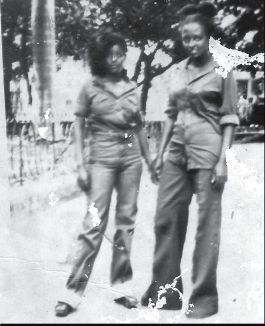
Above: Teenage Ethiopian Girls in Cuba
Tadias: Although The Unhealing Wound focuses on those Ethio-Cubans still in Cuba, we understand there have been a number who have managed to leave Cuba and live elsewhere. When did they leave and where do they live now?
Aida: In addition to providing primary education, the Cubans have also educated University students during this time period. For many of the Ethiopian students who attended universities in Cuba they have managed to return back to Ethiopia and find viable means of supporting themselves. In fact during the Derg period, many of the students that completed their education were given housing and job opportunities upon their return to Ethiopia. However, after the fall of the Derg government, many of the students felt that returning back to Ethiopia would lead to further economic hardship. In 1991, the Soviet Block fell and many of the students begun leaving to countries such as Spain, Greece, Holland, U.S., etc. I am not exactly sure how many returned to Ethiopia and how many went to other destinations. My assumption is that the greatest number of Ethiopian-Cubans are in Spain.
Tadias: Is there a network of Ethio-Cubans abroad that help others still in Cuba to immigrate to other countries?
Aida: As far as I know, there is no organized effort by Ethio-Cubans that continuously assists the Ethiopians to leave Cuba and resettle to a third country. Although it is a tightly knit community in Cuba, once abroad, it’s more so through the efforts of individuals helping new comers than an established network.
Tadias: What kind of relationship do Ethio-Cubans have with Cuba? Do they identify in any way as Cubans?
Aida: From my observation of the Ethio-Cubans, there is a special relationship between the Cubans and these Ethiopians. It is clear that they still identify themselves as Ethiopians but they have fully taken on Cuban mannerisms and cultural habits in the ways they interact with others and express themselves.
Tadias: You mentioned that many Ethio-Cubans faced challenges in adjusting to their new environment when they moved to Cuba. What were some of those challenges?
Aida: The challenges were similar as any immigrant faces when they arrive to a new country, but imagine that through the eyes of a ten year old. The first problem that they had was the climate. The temperature was a big issue. They were moving from the highlands of Ethiopia to a tropical island. The second was the food. The food in Cuba consisted of pork, rice and beans in contrast to eating Injera their whole life. Then, of course, language and homesickness were major issues.
Tadias: You left Ethiopia as a child as well. Is there a relationship between your interest in the Ethiopian students in Cuba and your own experience?
Aida: There was definitely a relationship to my life. I went to boarding school at a young age in Cyprus away from my family. One of the things that attracted me to the whole story and enabled me to empathize with them was the struggle I faced as a child who felt alone in a foreign land.
Tadias: Does the Ethio-Cuban story fit into the themes that you address in your photography work?
Aida: My beginning as an artist is in photojournalism and this story at first was supposed to be a series of photographs about these Ethiopians. However, I decided that their story was too compelling to be told solely in still photography. The Unhealing Wound is an exploration of themes that captivate me as a photographer and a filmmaker. It all comes down to capturing life and in this case it is capturing our past history and also documenting the history as it is happening. I hope that thirty years from now, anyone can look back at this film and have a better understanding of our struggles, triumphs and sacrifices as Ethiopians in the landscape of the immigrant life.
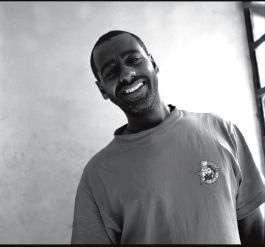
Above: Aredo. Photo by Aida Muluneh
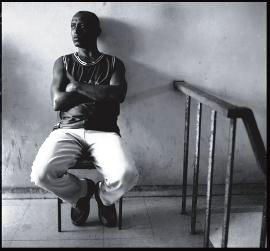
Above: Motbaynor. Photo by Aida Muluneh
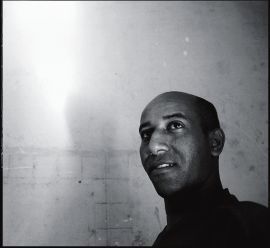
Above: Teddy. Photo by Aida Muluneh
—-
Find out more about the film at pastforwardfilms.com.





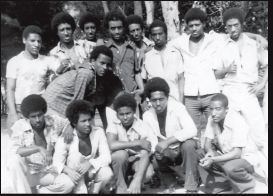
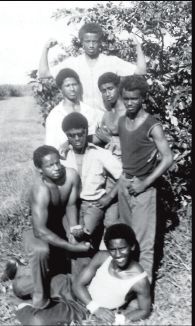





















Aida,
I wish you success in your work! It is great to see Ethiopians interested in documenting the simple and yet very important stories of our people.
Hi Aida, thank you for the effort you have done to assist Ethiopians in Cuba. The Ethiopians have no better alternative in Ethiopia. It is better for them to escape and request asylum in another western or European countries. Mengistu was better than melese 100%. At least Menge loves Ethiopia. Thank you
Those poor souls are probably lost forever. I wouldn’t think life will be easy for them in Ethiopia. I hope you will give us a real glimpse of their lives in Cuba. I imagine they may need serious help from their land and government for resettlement, emotional help, etc.
Thank you for your great effort.
Indeed what a moving story! I remember reading their story on Addis Zemene/Ethiopian radio when the children were sent to Cuba and related stories.
Aida;- inf act if you can I will also advice another project to take if you can. And, that is; to trace and do some interview of those who were fathered by Cubans in Ethiopia while the Cuban soldiers were in Ethiopia “Tatek Tor Sefer” (the biggest military training center in Ethiopia. In one incident, I went to TaTeK Tor Sefer to visit a family member who was getting trained in the army and I saw about two hundred or more Cuban soldiers going back to Cuba after finishing their term to be relieved by new others coming from Cuba. At that moment I saw ten or so mothers wiping tears some young ladies and some holding light skinned infants on their arm saying Goodbye to the soldiers which later I found out that they had children from or being pregnant from the Cubans soldiers. The number of the children fathered by Cubans is unknown, but I wonder if the children or the motehrs still established communication with them in Cuba? I just threw this idea in case you are interested.
Thanks
Getachew Reda
wwww.Ethiopiansemay.blogspot.com
Amazing. This is such a touching story. It is great to hear about our forgotten brothers and sisters. It is the responsibility of every Ethiopian in the diaspora to help this people get out of Cuba and establish a new life in a country where they will have better opportunities.
Thanks Aida, for bring this to light.
Everybody had different level of difficulty in any place they settle. A Medical doctor in the US may complain about Life. It is relative. Regardless of the Pain, the best thing that life offers is joy through suffering, you can turn Hell into Heaven not only in Cuba , but also in Kenya, Beiruit …
There are a number of web sites about Ethiopians in Cuba, which is done by Ethio-Cubanos.
I do not think the film would be able to reflect the real life through old photos and intervewing a handfull of people.
Deja eso para nosotros!!!!
(Ethio-Cubano)
Aida,
I wish you the best in your documentary and when it is released, I will be the first one to get it because I use to live on isla de la juventud (isla de pinos).
Please let us know when you are done with the documentary.
God bless you girl!!!!
Tadias,
You are doing excellent stories, please keep doing the same research based stories and documentaries. I am glad, I found Tadias Magazine and I am loving it. Yours is informative, educational and unbiased. I am going to spread the word out about tadias.
Just a question,
Are you planning to donate a portion of the income from the movie or book to this community?
I really appreciate your effort in introducing these Ethiopians to the rest of us. Try to publicize it in mainstream media as well with your compelling story.
I think that will produce the biggest good to the film and to them.
Thanks.
Dear Aida,
Thank you for your effort in documenting the lives of Ethiopians in Cuba.This is the story of Ethiopians all over the Diaspora, it is the story of Ethiopians in the twenty first century. It is the story of loosing touch with self whether by choice or force. We have become the lost generation of modern day Ethiopia caught between two worlds.
I read your piece and enjoyed your honesty and concern. What is so amazing is how the interviewer and readers have responded to what Cuba and the Cubans have done for these young children.
Here is what is irritating, it is so sad how we have been brain washed by western media. One feels the undertone in the story of wanting to make Cuba a villain in what they have offered these young children.
Once again thank you for your work and the honesty you brought into the interview.
Good Luck and best wishes!
It is a sad story.
My advice to my brothers and sisters is to remain strong in your own faith, and you will be the happiest person in any situation you are.
God Bless you all
Dear Aida,
I thank you for the all things you are doing to tell us the story of Ethiopians in Cuba.
I have several Ethiopian friends who went to Cuba for a holiday, but they never mentioned to me about Ethiopians in Cuba
That’s because they don’t know that Ethiopians live in Cuba.
Well done!
I’m cuban and knew a lot of Ethiopians while studying in Havana. For us Cubans one thing was very impressive: the way they dominated our version of the Spanish language despite the huge difference to Amahric. We considered them very clever. By the way, the most intelligent clique I met there were orphans: children of killed soldiers from Haile Selassie’s loyal guard. After over ten years of communist education in Cuba these guys still hated Mengistu, Castro and the whole left shit. I admired this.
Our best wishes for you and your documentary. Good luck!
Dear Aida,
You are very couregouos lady with a fantastic story. I am deeply touched by the story of Ethiopians and the kindness of Cuban government and the people of cuba. Cubans will remain our friends errespective of what is happening. No one gave his life for others except Crist. They are the walking Crist and our brothers should be proud that they are just like their holy land.
There will be time that our country gathers its children and pay the favors and opportunities given by our cuban brothers and Fedle Castro.
Dear Aida,
I’m glad you came up with the idea of making a film about the Ethio-Cubans. And I’m sure the film will be great as everything you do.
I am not surprised to know now that the Cubans were good to the Ethio-Cubans since late 1970s. The Cubans are warm and energetic people.
When rich people give, you appreciate and thank them. When poor people share with you the little they have, you still appreciate and thank them but you are touched. When poor people die helping you fight your war and take in thousands of war orphans of yours and raise them, what can you do?
Fantastic story.
primeramente aida guien eres fuiste estudiante en cuba cual es tu motivo para hacer este documental o tienes algunos ethiocubanos al lado tuyo de toda forma todavia hay tiempo pra la critica pero espero tu respuesta
saludos
pepe
Aida , i respect you also God help you . these Ethiopians are the victims of their own country, so we have obligation to help them in resettlement and all the possibility for them because they are without home land .
where do the Ethiopians live in Cuba, i am a tourist and want to meet some Ethiopians here.
Ms. Aida,
{This movie does not correctly reflect the reality of EthioCubanos…your documentary excludes 80% to 90% of us. You should know this because we already told you about it. Thanks.}
Ms. Aida,
Well done. I am EthioCuban, ignore them.
Hi Aida i am so much interested in what you have done. i have plans to go to Havana for a vacation next week. can you please give some tips. thank you-
WELL DONE. BRA JOBBAT. BIEN HECHO. BETAM TIRU